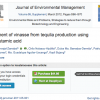
Autores:
Carvajal, Zarrabal, O
Nolasco-Hipólito, C.
Barradas-Dermitz, D.M.
Hayward-Jones, P.
Aguilar Uscanga, M.G.
Bujang, K.
Revista y/o libro:
Journal of Environmental Management
Volumen:
95 Suplemento
Año:
2012
Sinopsis:
Vinasse, the wastewater from ethanol distillation, is characterised by high levels of organic and inorganic matter, high exit process temperature (ca. 90 °C) and low pH (3.0–4.5). In this study, the treatment of tequila vinasse was achieved by a flocculation–coagulation process using poly-γ-glutamic acid (PGA). Results showed that the use of PGA (250–300 ppm) combined with sodium hypochlorite and sand filtration managed to remove about 70% of the turbidity and reduced chemical oxygen demand (COD) by 79.5% with the extra benefit of colour removal. PGA showed its best flocculating activity at pH 2.5–3.5 and a temperature of 30–55 °C. Such a treatment may be a solution for small tequila companies for which other solutions to deal with their vinasse may not be economically affordable.